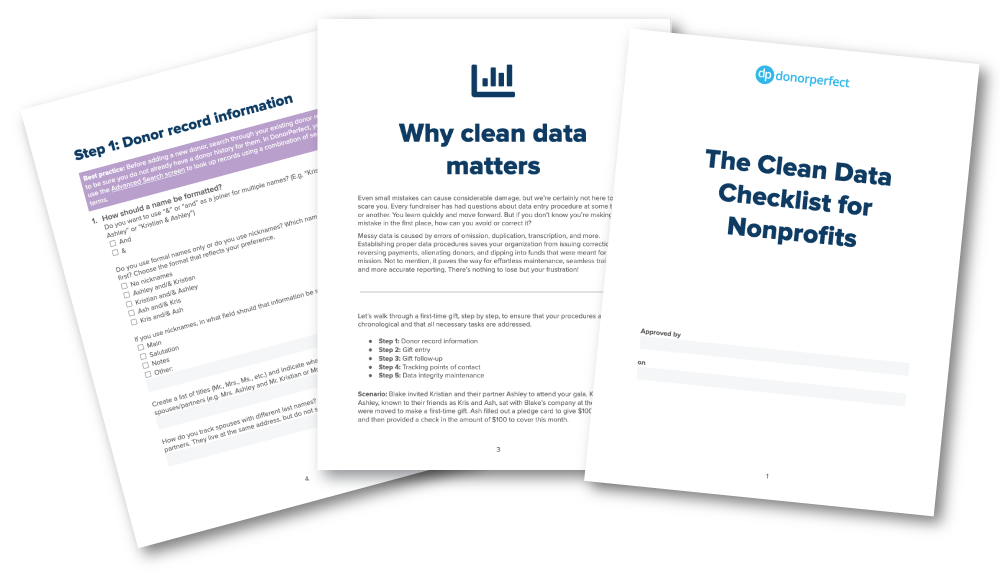Nonprofit Technology & Fundraising Blog
Subscribe to our mailing list

September 12, 2023 | Fundraising Operations
When it’s time to plan for the future, what happens if your nonprofit’s data doesn’t make sense? The task of reconciling fundraising and accounting data in two separate places can produce numbers that don’t quite add up. When there are discrepancies between the two most crucial aspects of nonprofit financial management, it leaves fundraisers confused, frustrated, and potentially misinterpreting organizational data.
With the right tools for data reconciliation, discrepancies can quickly be resolved – or avoided altogether – and fundraisers can easily maintain accurate financial records while streamlining fundraising operations at the same time. Keep reading to learn how.
Relying on manual data entry can give the illusion that your organization’s “money in” and “money out” accurately reflect your overall expenses and fundraising results, but if you have more than one employee entering data or more than one method of entry, it’s likely that there are mistakes hidden in plain sight. Smart fundraising solutions – like a constituent relationship management system (CRM) that syncs with QuickBooks – can take care of this task for you, and with fewer errors!
That said, the simplest way to bridge the gap between your fundraising and accounting data is with integrated CRM accounting software. Rather than manually entering data twice, or spending extra time importing/exporting information from one system to another, look for fundraising software that integrates with a trusted accounting solution. Together, they can simplify and/or automate the data entry process to save resources and reduce errors, among many other nonprofit benefits.
DonorPerfect users: Integration with QuickBooks Desktop and Online is included with most DonorPerfect subscriptions! And with QuickBooks Online, there’s no need for importing or exporting data – you can sync all gifts and expenses in one single view, organized and summarized by your nonprofit’s transaction details. Contact your Account Manager to get started!
Don’t have DonorPerfect? You can still purchase QuickBooks Online through our knowledgeable fundraising experts, or sign up for a DonorPerfect package that already includes the QuickBooks integration! Click here to get started.
Overcommunication isn’t usually a concern when it comes to financial management – the more information recorded, the better. To address the mystery behind mismatched numbers, it is essential to modify your reports to reflect what is happening in both your fundraising and accounting areas. This is easily done using an integrated solution that allows you to organize and summarize each transaction by nonprofit-specific details.
With an integrated accounting solution that allows nonprofit employees to document transaction details and add notes where necessary, the organization gains a full view of its finances in one place, without headaches or unanswered questions.
Example: Using QuickBooks Online, fundraisers can take advantage of what’s called class accounting – tracking transactions by fund, initiative, or any other meaningful segments – so that when it’s time to run reports, there’s a clear picture of each segment’s financial health. This information can then be used to set a budget goal for each class.
This process will improve communication between development and executive teams for better strategic planning, which brings us to the final step!
Clear and consistent communication is the backbone of data reconciliation best practices. Even the most advanced software can’t compensate for a lack of effective communication. That’s why establishing clear-cut standards, like cutoff dates and standard recording methods, is an essential part of both teams being on the same page.
By fostering effective communication through integrated fundraising and accounting, nonprofits can minimize misunderstandings, maintain accurate records, and ensure a cohesive reconciliation process.
Example: For instance, if a Development Director receives a conditional gift from a corporation, they will record it, even if the condition has not been met. However, as a general accounting rule, this amount will not be reflected in accounting records until the condition is fulfilled. Without communication on how to handle such conditional gifts, the numbers are likely to diverge, leading to unexplained discrepancies in the report’s notes column.
Pro tip: To keep everyone on the same page, consider establishing and documenting your organization’s standards for collecting and organizing data in a shareable resource that you can distribute to both teams. We recently created a similar resource to help fundraisers keep consistent donor records, called the Clean Data Checklist for Nonprofits – free to download for help or inspiration!

Reconciling nonprofit data requires attention, coordination, and effective strategies. By implementing fundraising software that integrates seamlessly with a trusted accounting solution, nonprofits can streamline their financial management processes and avoid the boardroom nightmare of mismatched numbers. For more tips to maintain accurate records, facilitate better resource allocation, and ultimately propel your organization’s financial success, download your free copy of Better Together: Financial Harmony with Integrated Fundraising & Accounting, available below.
Follow us on social!